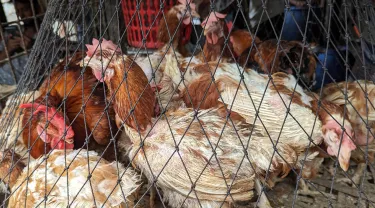At least 75% of emerging and re-emerging infectious diseases of humans—including Ebola, Nipah virus, and zoonotic avian flu—have an animal origin. Chances are that when the next illness like COVID-19 emerges to threaten global health, it will originate in animals before it passes to humans, in a process known as spillover.
Strategies to Prevent Spillover, or STOP Spillover, a global consortium of partners with crossdisciplinary experience funded by the U.S. Agency for International Development (USAID) and led by Tufts University, aims to keep that tipping point from happening, or at least to mitigate its dangerous effects.
STOP Spillover Project Director Hellen Amunugi, associate professor in the Department of Infectious Disease and Global Health at Cummings School of Veterinary Medicine, explained that the group’s focus is to build capacity and prepare countries to identify high-risk interfaces, control zoonotic diseases at their source before they become epidemics or pandemics, and develop interventions that reduce risks of exposure in human populations.
Begun in late 2020, STOP Spillover has so far partnered with colleagues in Bangladesh, Cambodia, Côte d’Ivoire, Liberia, Uganda, Vietnam, and Sierra Leone. Teams of experts collaborate to develop country- and locality-specific research studies and interventions to reduce risks associated with selected viral zoonotic pathogens and to prevent their spread.
From the outset, the consortium has been heavily focused on engagement, working with stakeholders at the national, regional, and local levels to reduce risks of exposure to and mitigate the spread of selected zoonotic viral pathogens, including coronaviruses, filoviruses (Ebola and Marburg viruses), avian influenza, and Lassa mammarenavirus, among others.
The program identifies places where spillover is most likely to occur and designs risk-reduction interventions.
In Liberia, for example, STOP Spillover is conducting research to understand Lassa mammarenavirus distribution in rodent reservoir hosts, both within what is considered the “Lassa belt” and beyond. At live bird markets in Dhaka, Bangladesh, where the threat of highly pathogenic avian influenza is a concern, efforts are underway to develop a coordinated and sustainable platform for pathogen surveillance and data sharing. In Côte d’Ivoire, Cambodia, and Liberia, teams have been trained to safely collect samples for surveillance of wastewater and liquid waste effluent, with potential testing for multiple zoonotic viruses.
The aim of this work: to leverage the longstanding work of Tufts and its consortium partners in bringing One Health approaches to create surveillance processes that can act as “early warning systems” for potential spillover events and, in doing so, address some of the most complex and significant health challenges of our time.
